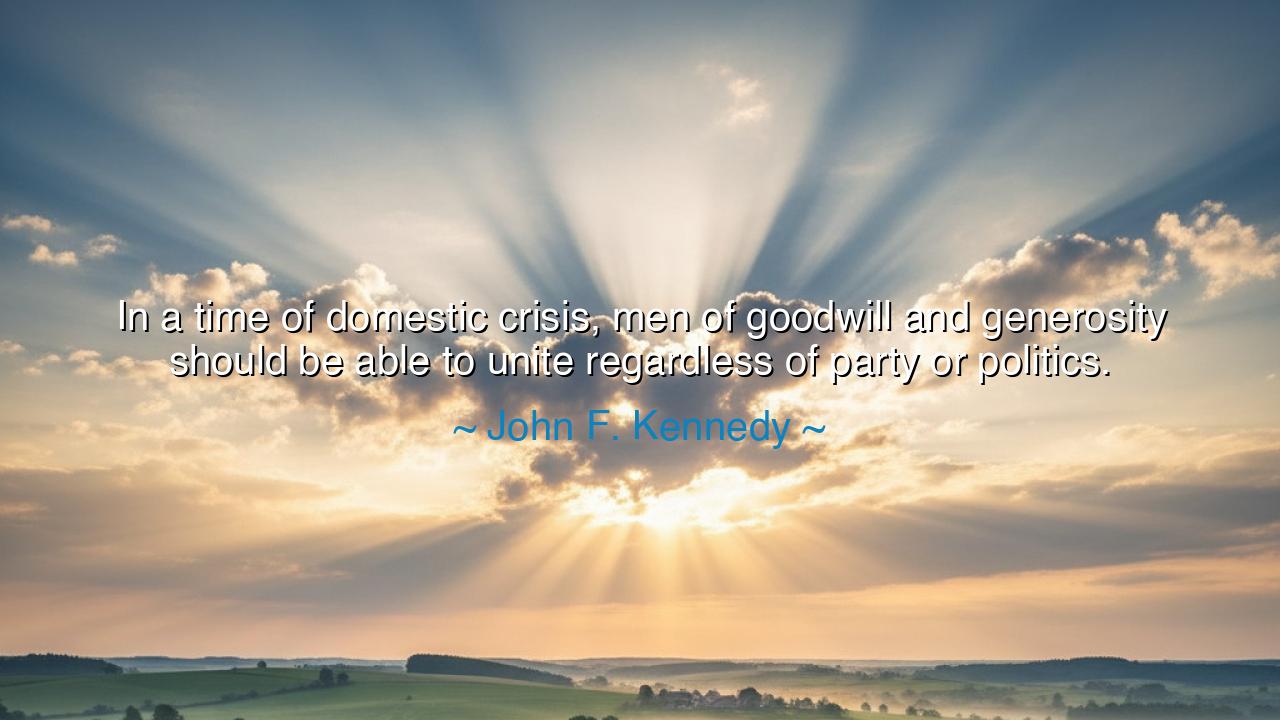
In a time of domestic crisis, men of goodwill and generosity
In a time of domestic crisis, men of goodwill and generosity should be able to unite regardless of party or politics.






Hear, O children of the Republic, the voice of John F. Kennedy, who stood in the tumult of the twentieth century and declared: “In a time of domestic crisis, men of goodwill and generosity should be able to unite regardless of party or politics.” In these words is a summons to rise above faction and ambition, to remember that the nation is greater than the quarrels of its leaders, and that unity in compassion is the truest strength of a people.
For domestic crisis is the hour when the house shakes and the people tremble. It may be war, it may be famine, it may be the bitter divisions of injustice—but in such times, the ordinary feuds of party must fall silent. Kennedy called for goodwill and generosity, for he knew that kindness and cooperation heal wounds faster than pride or rivalry. A nation cannot survive if its leaders cling to division while the people suffer.
History offers many mirrors of this truth. In the dark days of the Great Depression, Franklin Delano Roosevelt reached across divides to rally a broken nation. His New Deal was not born of partisan victory alone, but of a shared recognition that without bold action, the Republic itself might collapse. In that moment, Democrats and Republicans alike were forced to see that survival depended upon unity, not endless conflict.
So too in World War II, when Roosevelt and later Harry Truman led America through global strife, politics at home gave way to a spirit of national mobilization. Factories turned to arms, women entered the workforce, and leaders from different factions worked together to ensure victory. Though disagreements remained, the larger cause demanded union. Here Kennedy’s words find their echo: in crisis, cooperation becomes not a luxury, but a necessity.
Therefore, let this wisdom endure: the measure of statesmanship is not only in victory over rivals, but in the ability to put aside rivalry for the sake of the people. Politics may serve in times of calm, but in times of trial, it must be transcended. Kennedy’s words remind us that nations endure not by division, but by unity of heart, where men and women of goodwill stand together, lifting their country through storm into light.






HLLac Ha Luu
John F. Kennedy’s quote challenges the assumption that political differences should always be an obstacle to progress, especially in times of crisis. In today’s climate, it feels like compromise and unity are in short supply. What would it take for political leaders to put aside party lines in favor of real action that benefits the nation as a whole, as Kennedy envisioned?
TNNgo Ngoc Tuyet Ngan
Kennedy’s message about unity in times of crisis is both timeless and idealistic. The notion that people of goodwill can overcome their political differences for the greater good is something we could use more of today. But do you think that genuine goodwill still exists in the political arena, or is it something that’s been overshadowed by partisanship and political gain?
MLmessi lionel
This quote makes me think about the importance of collaboration and compromise, especially in times of national crisis. Kennedy’s call for unity transcends political divides, but how do we bring this concept to life in a society that is often more divided than united? What are some practical ways we can encourage politicians and citizens alike to act in the interest of the common good?
DTNguyen Duc Tri
Kennedy’s belief in the power of goodwill over party politics in times of crisis reflects a noble ideal. However, in today’s era where party loyalty is often prioritized, how realistic is this expectation? Do you think we still have leaders who are capable of rising above their party lines when the country needs them the most, or has the system become too polarized for that?
TTThanh Tin
Kennedy’s ideal of unity in times of crisis is inspiring, yet it feels harder to achieve today with the increasing political divide. In situations of national crisis, should the focus be on unity over partisan politics? What role do you think the media and social media play in either facilitating or hindering this kind of unity among leaders and citizens?